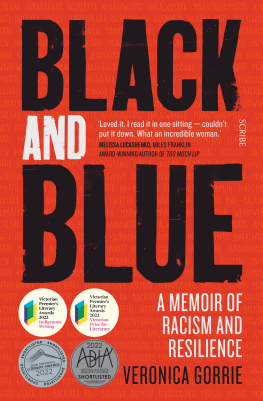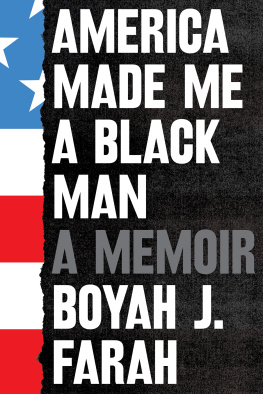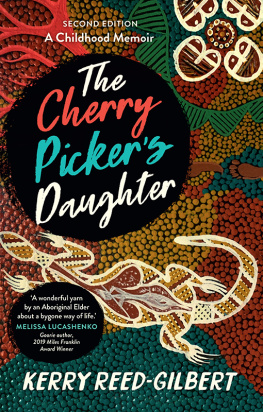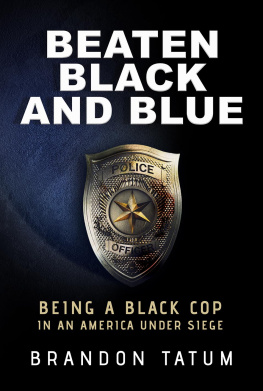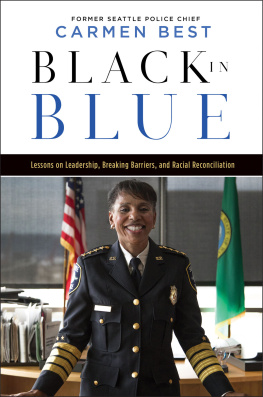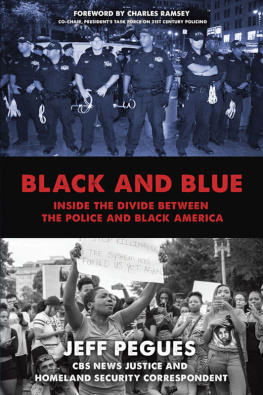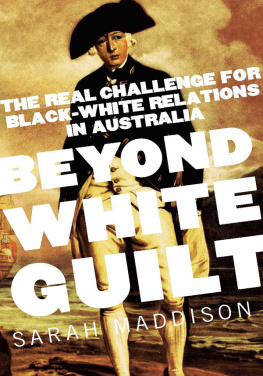
Contents
BLACK AND BLUE
Veronica Gorrie is a Gunai/Kurnai woman who lives and writes in Victoria. Black and Blue , a memoir of her childhood and the decade she spent in the police force, is her first book.
Scribe Publications
1820 Edward St, Brunswick, Victoria 3056, Australia
2 John Street, Clerkenwell, London WC1N 2ES, United Kingdom
3754 Pleasant Ave, Suite 100, Minneapolis, Minnesota 55409, USA
Published by Scribe 2021
Copyright Veronica Gorrie 2021
All rights reserved. Without limiting the rights under copyright reserved above, no part of this publication may be reproduced, stored in or introduced into a retrieval system, or transmitted, in any form or by any means (electronic, mechanical, photocopying, recording or otherwise) without the prior written permission of the publishers of this book.
The moral rights of the author have been asserted.
The words meaning policeman on the cover come from various Aboriginal languages, and were either supplied by the author or sourced from the following article: Cockatoos, Chaining-Horsemen, and Mud-Eaters: Terms for Policeman in Australian Aboriginal Languages, by William McGregor, published in Anthropos , 95(1), 3-22.
Scribe acknowledges Australias First Nations peoples as the traditional owners and custodians of this country. We recognise that sovereignty was never ceded, and we pay our respects to their elders, past and present.
9781925849240 (Australian edition)
9781950354757 (US edition)
9781925938814 (ebook)
Catalogue records for this book are available from the National Library of Australia.
scribepublications.com.au
scribepublications.com
FOREWORD
Veronica Gorries Black and Blue speaks to the significance of remembering as foundational to Indigenous resistance and survival. Most people look to the past as a remembering of good times, of those moments we are most proud. But Gorries remembering is about exploring the past in all of its ugliness, with love, care, and compassion. It is this compassion that demonstrates the difference between the Black Witness and White Witness, of which Darumbal and South Sea Islander journalist and scholar Amy McQuire (2019) so famously wrote:
While the White Witness thrives on accounts of the brutalisation of black bodies, most commonly of black women and children, the Black Witness pushes these same black women to the forefront While the White Witness uses the language of war to disconnect us from our past, the Black Witness uses it to connect our past to the present.
In speaking of trauma, Gorrie, as the Black Witness, speaks of her own she does not extract others stories to centre herself as the lead character or heroine. She affords a generosity to those she speaks of, even those who brutalise her, and unlike the White Witness, she refuses to pathologise them. This is a potent example of the strength of Blackfullas and specifically of the power of the Black female writer. It is a modelling of a humanity that is too frequently denied us. Gorrie speaks of failure, of her own failure, as a mother, as a cop, and as a human being, in such a way that you cant help be reminded of what a beautiful, loving, and compassionate woman she is a woman that we get to know throughout the book, even as a small child trying to make sense of the violence she witnesses outside her bedroom window.
This is a story of Black trauma, no question about it, but it is also a making sense of through the telling. And in almost every encounter, there is a reminder of Black humanity whether the protection by a sister, the tears of a father, or the curiosity of a child. Interestingly, Gorrie doesnt delve into rich descriptions of scent or the texture of things so much. She doesnt want to take the reader to that place, or linger too long, because she knows too well how hard it is to revisit. She tells us what we need to know. And in doing so, we are taken into her world through the frequency and consistency of events. It is a kind of storytelling Im most familiar with as a Blackfulla: one of events that the listener, the reader, must make sense of on their own. Gorrie doesnt pause to hold the hand of the reader, except through some humorous asides in those moments she has a story to tell, after all. And there reads a sense of urgency in getting it out. The speed and frequency of the trauma she recounts can be hard for the reader to bear, no matter how familiar they may be with it.
As I finished the book, I was left wondering how one Black body can carry it all (knowing that this story didnt get to the all of it, even) and, too, I was left angered as to why so many Black bodies must carry so much of it. Yet from this comes the power and pride of Blackfullas when we assert still here, because our bodies know all too well the challenge of that assertion on the daily for so many of us. To be here in spite of it all is an exercising of our sovereignty in the most profound way possible in a settler colonial state. When Gorrie tells of the violence she experienced as a Black member of the Queensland Police Service who was advised to leave as a means of survival, she models a remembering that is foundational to an embodied Black sovereignty. She states, I didnt quit, though I put the Aboriginal flag on my desk. This is the sovereignty in refusal that Mohawk scholar Audra Simpson wrote of: not a refusal to participate, but a refusal to leave the places they deem us incapable of occupying. It is in Gorries remembering of her grandparents that we get a sense of the origins of this. In describing them, she says, The problem was, they refused to conform to town life and now, looking back, I think thats what I loved about them most. Indeed, the daily exercising of sovereignty has always been seen, by the settlers, as a problem in this place: a problem to be solved via erasure from the landscape and from the category of human.
As the wife of a Black police officer who also retired on medical grounds, it was strange to me to recognise that with all the trauma that Blackfullas have endured intergenerationally, it is the white institution that eventually breaks our backs, or our families. In all of the talk of Black dysfunction, there is typically little space to interrogate how white workplaces end up being most dispossessing to the sovereign Black spirit, bringing the most violence into Black homes. But I think perhaps it is in our refusal to accept their account of us daily, on the job that the Black body is subject to the most brutality. And that is because it occurs in a place which one presumes to have been granted entry: that one has run fast enough, fired accurately enough, passed the requisite exams, and been deemed psychologically sound. There is a presumption in having met the standard for entry into the service that one has also been granted entry into the category of human. It is the constant disappointment and betrayal that we havent and never will no matter how much we put our bodies on the frontline for them that is brutalising every day to the souls of Blackfullas. And this is the thing with Black and Blue : the most telling accounts of violence upon Blackfullas are not to be found among the interactions of the most marginalised the Black but in their encounters with one of the most powerful institutions the Blue. And, in Gorries case, as one of that institutions members.
For some people, forgetting is integral to their survival; a forgetting that supposedly enables a letting go. But remembering what bodies must bear, must hold, reminds us of the importance of stories, and the significance of them being told. Gorrie, always conscious of how she was read as a child, as a mum, as a cop not only finds the power to tell her story but also claims the power of that storytelling by constantly reimagining and contesting the supposed account of her. It is glorious and hilarious. Her observations in those moments remind the reader that she is not a victim, agentless and passive. She is here to tell the truth of the Queensland Police Service, of the good and the bad. She so powerfully captures the hopelessness she felt when, having met the markers of success within the police force, she was discarded when her body could no longer withstand it.
Next page
